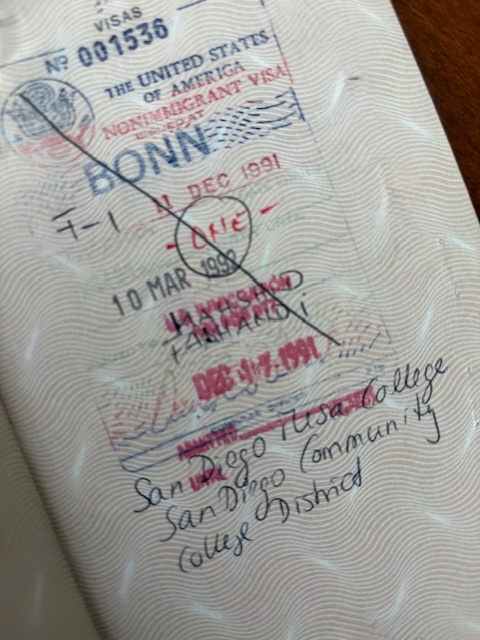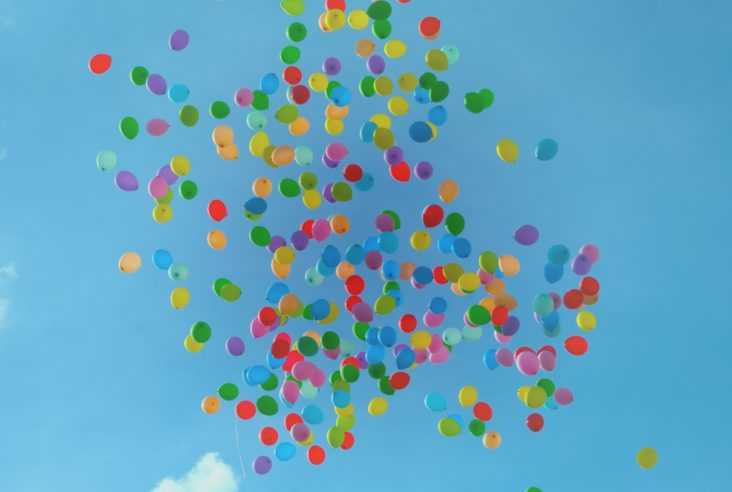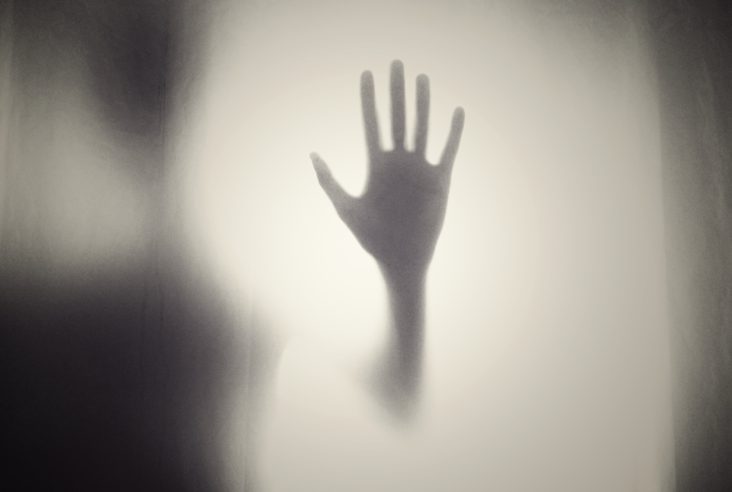By Mahshid F. Hager
I still remember the day I went to the U.S. Embassy in Frankfurt to apply for my F1 visa. I was so nervous. The night before, I triple-checked my documents: signed application form, TOEFL scores, I-20 and acceptance letter from Mesa College in San Diego, my passport—check, check, check.I stared at my brown Iranian passport, the words Islamic Republic of Iran embossed in gold in Farsi and English. I wished, not for the first time, that it were a different passport—especially for this visa.My uncle flew in from San Diego to support me. He knew how much this meant to me and wanted to be there, even if just for moral support. Dad drove us to the US embassy in Frankfurt. During the two-hour ride, my uncle coached me.
“They’ll speak German, but try to respond in English,” he said.
“They’ll ask why you want to study there. What’s your answer?”
I wasn’t used to speaking to him in English but I replied shyly, “The U.S. education system is highly regarded. I’d benefit a lot from studying abroad.”
“Good,” he said, “but say ‘the U.S.,’ not ‘the United States.’ And when they ask about your plans after Mesa, say UCSD.”
“What’s UCSD?”
“University of California, San Diego. But no one calls it that. Just say UCSD.”
When we arrived, armed guards searched our bags. My heart raced, my hands shook. We checked in, got a number, and waited with about 30 others. One by one, people were called to the windows for their interviews.
My uncle sat with me the entire time, quietly offering encouragement:
“You got this… This is exciting… You’ll do great.”
Finally, it was my turn. I approached the window alone. I handed over my documents and answered all the officer’s questions—even the unexpected ones, like whether I’d been to San Diego before. I said no, but I was excited to go. He smiled, complimented my English, nodded toward my uncle pacing behind me, and said everything looked complete. The application would go through a secondary background check, and I’d hear back in about six weeks.
Afterward, my uncle high-fived me. “How’d it go?” he asked. I had no idea. I was still dazed. We took a photo outside with the American flag waving in the background.
Those six weeks felt endless—like waiting on hold to hear what your future would be. Then one day, the letter arrived: my F1 visa had been approved and was ready for me at the consulate in Bonn. I could finally begin planning my move from Germany to the U.S.
I was on an F1 visa throughout my entire college journey. I earned my Bachelor’s in Psychology and later my Master of Science in Marriage and Family Therapy—both from San Diego State University. As an international student, I paid nearly triple the tuition of in-state students. These fees, often used to subsidize local tuition, were a significant financial burden for my family in Germany. But they believed in this dream enough to carry that weight.
While I was in college, I witnessed the election—and later impeachment—of Bill Clinton, the rise of the internet, and the end of the Cold War. I loved the energy on campus around these and other issues. I thrived in classroom discussions, where faculty encouraged critical thinking and bold writing about the political landscape. I was inspired by classmates who turned their passion into community action.
This was the promise of America: a playground for free thinkers, a place for bold ideas, a home for the next generation of changemakers. That promise is what drew me—and so many others—to this country as students.
Today, Donald Trump posted on social media calling us “crazed lunatics,” accusing us of wanting to “rip this country apart.” To be labeled like this by the president—after years of studying, contributing, and building a life here—feels like being cast out of a story I thought I was part of.
It’s been an excruciating time these past few weeks, as I’ve watched and read about hundreds, if not thousands, of F1 student visas being canceled or terminated without explanation. I’ve seen students handcuffed, taken away in unmarked vans by unidentified ICE agents—without any semblance of due process. I can’t even imagine the disruption and the devastation this is causing for these students, their families and their communities. They came here with hope, courage, and a vision for their future—just like I did. They are scholars, dreamers, bridge-builders. Many of them have sacrificed more than most can imagine just to sit in a classroom, to contribute, to belong.
Most are being punished simply for exercising their right to free speech. The promise of America—the one that drew me here—wasn’t just about academic opportunity. It was about the freedom to speak, to question, to protest, and to imagine something better. That’s what I believed in. That’s what so many of us believed in. When that freedom is denied—especially to those who came here believing in its promise—it raises a deeper question: If the right to speak and dissent can be taken from some, how safe is it really for any of us?
I remember one time returning back from Germany where I had spent my summer. I was in my 1st year of grad school. The customs agent looked at my passport and my F1 Visa stamp and asked “What are you studying?”
“Marriage and Family Therapy,” I replied.
“Are you planning to stay after you get your degree?” he asked.
“I’m not sure yet,” I said, a little worried about where he was headed with his question.
“I hope you do,” he said “We need more mental health practitioners in this country and you seem like a bright, young woman. I hope you stay.” He handed my passport back to me and smiled.
I’ve never forgotten that moment and its impact on me. I felt seen and welcomed. I want to believe that people like that still exist, even in this current environment. People who see the humanity in one another, those who see the potential rather than the threat. But I’d be lying if I told you that I am not afraid to leave the country again, even now, even as a naturalized citizen. This is the kind of unpredictability and lawlessness that has kept me away from my own country, Iran, for more than four decades.
I just never imagined I would encounter this fear here, in my chosen home.
And I am grieving the gradual loss of my dream. Many of us are.




This is a beautiful and thoughtful piece on following dreams to a place that used to be known for calling us all to dream. I’m so sorry to see what is happening and how painful this time in history is for the masses. I’m glad you’re here!
Thank you so much! I’m glad to be here too.